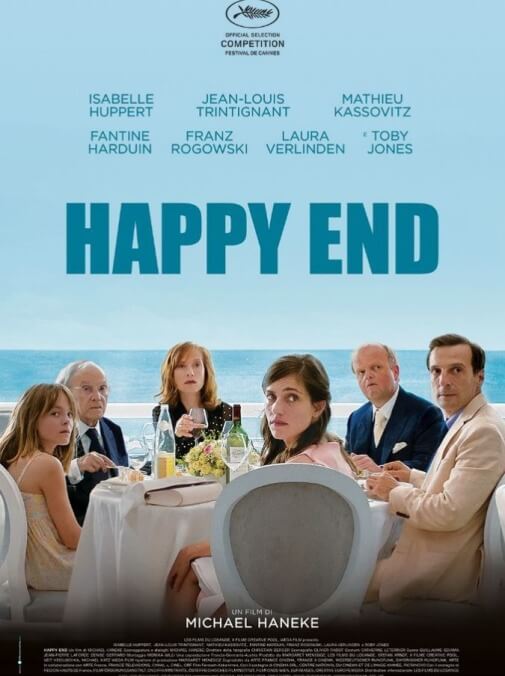Just in time for Christmas, Happy End offers the grueling greatest hits of Michael Haneke

A groaning death rattle for society, compassion, hope, justice, and maybe the uncompromising career of its maker, Happy End is far from the best Michael Haneke movie. But it just might be the most Michael Haneke movie—a kind of grueling greatest-hits collection from the reigning scold of European art cinema. Now, for the first time ever, it’s all available in one place: the technological voyeurism of Benny’s Video; the fragmentary storytelling of Code Unknown; the colonialist trauma of Caché; the twisted adolescence of The White Ribbon; the fatalistic finality of Amour. Haneke has probably earned a career summation at this point—now in his mid-70s, he’s been churning out masterfully controlled, sometimes thrillingly bleak audience endurance tests for 25 years. But without a fresh master thesis, all we’re basically watching here is the director go back to the well of bourgeois critique, rehashing ideas he’s better explored elsewhere.
At least the technology itself has been updated for our brave new world of indecency and indifference: Facebook messages prove pivotal to the plot, and when some offscreen mystery character shoots stalkerish vérité footage, it’s with a smartphone instead of a video camera. The amateur filmmaker turns out to be 12-year-old Eve (Fantine Harduin, one of those child actors with eerily adult features and disposition), who poisons her mother with antidepressants in the opening scene, capturing the whole incident on her iPhone. With mom in the hospital, Eve is sent to stay at the family estate in Northern France, and it doesn’t take long to realize that she’s just the the latest rotten apple to fall off a very toxic tree. There’s her remarried father, Pierre (Franz Rogowski), hiding a compartmentalized second life of debauchery under a cheerful façade; her adult cousin Thomas (Mathieu Kassovitz), resentful fuck-up and eventual heir to the family business; and her aunt Anne (Haneke regular Isabelle Huppert, bringing the brittle), current head of said business, and conspicuously rocking the same name as Huppert’s character from Time Of The Wolf.
It’s not the film’s most explicit callback. Jean-Louis Trintignant, the 87-year-old French New Wave veteran, perhaps literally reprises his role as the retired music teacher of Amour, now desperate for someone to do for him what he did for Emmanuelle Riva in that movie. Amour, of course, was something unexpected from the Austrian provocateur: an almost unbearably moving love story, all the more powerful for how unsentimentally it depicted the final days of a life and a relationship. So it’s especially dispiriting to see Haneke walk back that hard-won humanism in this quasi-sequel, which snuffs out every flicker of warmth in Trintignant’s Georges, reducing him to a defeated shell of a man. It feels like pure spite, honestly—Haneke cruelly punishing anyone who looked at the tenderness of Amour and assumed he was softening with age. In that sense, Happy End is also the closest he’s come to proving his staunchest detractors right; it’s as if he’s gone out of his way to deliver the coldly misanthropic lecture some insist he’s been making all along.
Formally, Haneke remains at the top of his punishing game. Few living filmmakers make more foreboding use of stillness, of quiet, of an ominously static frame; to study one of his careful compositions is to become seized by the hanging promise of violence—the feeling that something terrible could and probably will happen in any given moment. But in Happy End, even those little tense waiting games have a been-there, done-that quality. The film’s second scene unfolds entirely from the perspective of a security camera, coldly gazing from afar on a construction site, and the pregnant pause before “unexpected” calamity is almost self-parodic: the famous Haneke unease reduced to jump-scare formula. Christian Berger, the director’s regular cinematographer, frames the actors in boxy, sterile compositions, like specimens under the microscope. But there’s rarely any surprise to what actually happens in the petri dish. (One darkly comic exception: a stumbling karaoke rendition of Sia’s “Chandelier,” performed by Thomas, the Eric or Don Jr. of this awful clan.)
With its expositional elisions and vignette-like structure, Happy End has a puzzle-box quality: To watch the film is to see a vision of a bourgeois European family—of the bourgeois European family—come together piece by damning piece. But does the full picture tell us anything Haneke hasn’t already about the the corrupted values of the upper class? His evergreen contempt for the rich and the empty this time accommodates an implicit point about the refugee crisis—a subject that remains deliberately, pointedly on the margins of the movie, as a kind of key structural absence. But it also plays out with an inevitability that borders on the predictable. The most cutting thing you could say about Happy End isn’t that it’s a drag (you go to a Haneke movie to have your spirits exquisitely dampened) but that it’s a drag we’ve seen before. Building to an ending that fulfills the promise of its bitterly ironic title, Happy End feels conclusive in its resignation. But Haneke deserves a better swan song than this tapestry of recycled themes, elements, and characters. Let him have at least one more shot at putting the shock-buzzer to our delicate sensibilities.